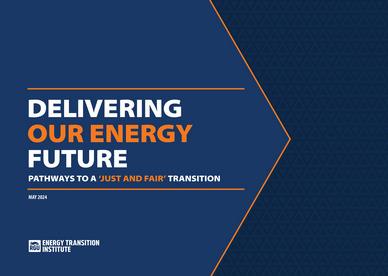
A new report by Robert Gordon University (RGU) has revealed that the UK will fail to achieve a ‘just and fair’ transition by 2030 unless there is urgent alignment across the political spectrum to sustain UK offshore energy industry jobs, supply chain investments and the economic contribution of the workforce.

In Delivering our Energy Future, RGU analysed over 6,560 pathways for the UK offshore energy industry between now and 2030. The report concludes that UK and Scottish political decisions, rather than energy market economics, will determine the size of the workforce and supply chain.
Of the thousands of pathways analysed, fewer than 15 or <0.3% meet the ‘just and fair’ transition principles. Even these limited scenarios require success by the renewables sector in achieving higher levels of ambition through billions of pounds of additional investment in the next six years.
Professor Paul de Leeuw, Director of the Robert Gordon University Energy Transition Institute, said:

'The UK still has a unique opportunity to create a new energy future. Accelerating the re-purposing of the North Sea as a world-class, multi-energy basin will ensure the sector can power the country for decades to come. The prize for the UK to get this right is enormous. But to deliver this requires action and urgency, which means faster planning and consenting and access to the grid. We also need more flexible electricity pricing mechanisms to avoid project delays or cancellation and a proactive focus on building UK content so we can design, manufacture, install, commission and operate some of the critical new infrastructure required. This, as well as building and maintaining the world class skills and capabilities developed over the last few decades, will be crucial.
'While there is consensus across all stakeholders including governments, politicians, industry organisations and economic development bodies that we need to realise a ‘just and fair’ transition, a far more agile and joined up approach is required to address how the country can best secure its energy ambitions, while addressing the cost-of-living crisis, managing energy security and delivering on the net zero agenda.
'The latest research reinforces the need for urgent alignment across the political spectrum to agree the short-term actions that will deliver a just and fair transition, maintaining the workforce to 2030 to deliver a long-term net zero future and the associated economic benefits for the country. If the UK is unable to deliver close to 40GW (from 15 GW at the end of 2023) of installed offshore wind capacity and UK content ambitions for the new activities by 2030, it is unlikely to retain the offshore energy workforce without additional activities.'
The ongoing decline in the oil and gas industry needs to be offset much more rapidly by identifiably greater levels of activity and higher UK content in renewables if any of the pathways to a ‘just and fair’ transition are to remain open. Otherwise, interim steps will need to be taken to address the decline in activities, including oil and gas production - which is currently expected to reduce by more than 40% by 2030.
Professor de Leeuw added:
'To achieve this outcome, the UK offshore energy sector needs to deliver on spend of up to £200 billion over the remainder of this decade across offshore wind, hydrogen, carbon capture and storage (CCS) and oil and gas projects. Given the magnitude of change that is needed in the energy industry over the coming years, this report is highlighting that the UK, and devolved administrations must urgently pursue credible energy pathways, which deliver a ‘just and fair’ transition for the sector and its workforce.'
For the purpose of its analysis, RGU used the United Nations definition of a ‘just and fair’ transition – ‘ensuring that no one is left behind in the transition to low carbon and environmentally sustainable economies and societies’ and defined this further by linking it to sustaining the UK’s 154,000 direct and indirect offshore energy industry jobs and by maintaining the supply chain and offshore workforce economic contribution at 2023 levels or better by the end of the decade.
Other key findings from the report:
- To sustain the offshore energy workforce at 2023 levels, the UK must deliver close to 40GW of installed offshore wind capacity (compared to c. 15 GW cumulative capacity in 2023) and up to 40% of the investment needed to achieve this to be spent in the UK by 2030.
- To sustain the UK offshore energy supply chain activities and capacity at an average of 2023 level, the UK must deliver around £10 billion spend by 2030.
- If the UK is unsuccessful in delivering the offshore wind ambition and UK content targets by 2030, it is unlikely to be able to retain the offshore energy workforce without progressing additional activities, including oil and gas over the remainder of this decade.
- Significant levels of new operational capacity and capability will be required to deliver on the ambition of up to 40% UK capex content for new offshore wind projects and up to 50% for oil and gas decommissioning activities by 2030.
- Each additional 10% of UK capex content for the offshore wind sector is estimated to yield between 3,000 (‘worst case’) and 12,500 (‘best case’) jobs by 2030.
- Between 50% and 85% of spend in renewables over the coming decade is likely to be capital expenditure related, requiring a shift toward a more capex focused workforce.
- RGU analysis highlights that every 10% salary differential between oil and renewables may require up to 7% more people to maintain economic contribution.
- c. 1 in 30 of the working population in Scotland are currently employed in or support the offshore energy industry versus 1 in 220 across the UK.
- If Scotland fails to capture a significant share of future renewables activities, selective oil and gas activities may need to be sustained until 2030 to retain the Scotland based offshore energy workforce, skills, supply chain and economic contribution.
Cabinet Secretary for Net Zero & Energy Mairi McAllan said:
'Scotland’s energy transition presents an era-defining opportunity for our economy and people: delivering on our climate obligations, safeguarding our energy security and ensuring a fair and just energy transition for our workforces and the communities they support.
'By working together, with absolute clarity of purpose, we will unlock the vast potential. Indeed, the transition is already happening with Scotland fast becoming a renewables powerhouse. In the past week alone - from ground-breaking on a £350 million high voltage cable manufacturing plant to a £100m investment at Ardersier Port - we have seen significant projects getting underway to drive forward the energy transition and kickstart significant economic and social benefits.
'The Scottish Government is determined to play its role in maximising these benefits - and negotiating the challenges – not least through the publication of our Energy Strategy and Just Transition Plan, which will set out our vision for a future energy system that delivers affordable, secure, clean energy and delivers economic benefits to every part of the country. We will continue to work closely with industry, communities and other key partners to deliver this vision and ensure a just transition for our energy workforce and for everyone in Scotland.'
Delivering our energy future report
Source: Robert Gordon University











